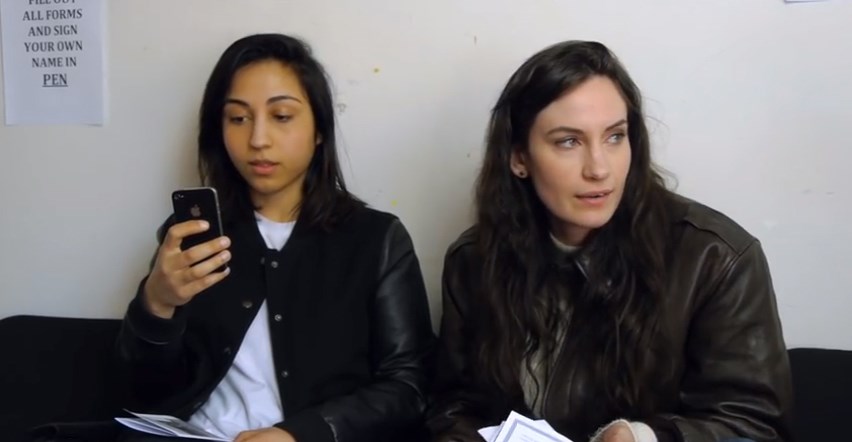Vancouver-based comedians Christine Bortolin and Bita Joudaki have been digging into each other’s brains since they were both just shy, charming comedy dorks competing at The Canadian Improv Games in high school.
“[Local comedian and musician] Aaron Read and I would always talk about how funny [Jourdaki] was,” says Bortolin, who is also a theatre and film actress. “I think we said ‘hi’ once that year. We were both very shy about things like that.”
Coincidentally, Joudaki and Bortolin were later picked to work in another comedy troupe at Instant Theatre and there they developed a friendship, which later became the creative partnership they have today. Over the years, the two have done stand-up, written and starred in various web-series, directed music videos, acted in plays and grown to be a big presence in the Vancouver comedy scene. Their most recent endeavor is a web series called Golden Futures (named after an apartment building in Vancouver’s Mount Pleasant neighborhood). The series was born after the two lost a Telus-sponspored web-series competition called Storyhive.
“You create an online pitch for a web series and then the public votes on the winning team who get $10,000 to produce their series,” Joudaki said. “We didn't win but they really liked our idea, so we decided to do it on our own.”
The first episode follows Joudaki and Bortolin to an STI clinic where the two completely clueless millennials take selfies, hit on a guy at the clinic (then ditch him for being “racist” when he isn’t responding with the sexual interest Joudaki desired) and think that chlamydiais a super power that helps one control the wind. These two moronic female leads don’t even know what birth control is, but instead think, “wishing really, really hard” right after sex is the best method to prevent pregnancy. Bortolin says this was on purpose, as she and Joudaki wanted to create comedic characters you rarely see associated with women.
“The aggressive schemer, the earnest idiot, the Commedia character Il Capitano and then pair it with honest responses to realistic circumstances that come up for us in real life.”
“I’m going to put you on YAZ,” says the female doctor to Bortolin while she’s on the table. “It has a history of killing women, but who doesn’t?”
“I was on YAZ while women my age were dying from it,” says Joudaki. “I remember I was sitting in class reading an article about the 18-year-old who died while at the gym and my arms went numb and I thought I was going to die too.”
YAZ was a highly publicized birth control brand that was suspected of having a direct correlation to the deadly blood clots some women experienced soon after going on the pill. YAZ was quietly recalled by the FDA in 2009, and more than 12,000 lawsuits were filed against the drug’s manufacturer, Bayer. However, a re-invented version of the drug remains on the market today. Every woman who shopped around for birth control options in the early 2000s remembers the ordeal of YAZ.
“I tried YAZ when all the cool girls in school went on it,” adds Bortolin. “But, then quickly stopped taking the pills when I decided no boys liked me and I would most likely not be having sex in high school.”
Golden Futures plays with #feminism, a generation educated by Twitter and digs into the whole idea of bandwagon-jumping spun out of control by our reliance on social media. The show is clever and snarky, mostly inspired by Bortolin’s frustration with men claiming female characters are so hard to write, which she thinks is simply not true.
“Dorothy L. Sayers talks about how men were surprised she could write conversations between them so well,” she told me. “[Sayers] would tell them that she worked through the issue by making men talk like ordinary human beings. We couldn’t find much comedic, female-driven web content from Vancouver, so we figured it would be good to get some shit out there. We started by writing sketches, keeping the stuff that landed, and transitioning it to film.”
Inspired by the mainstream appreciation for brazen, unapologetic comedians like Roseanne, John Oliver, Hari Kondabolu and comedy darling Amy Schumer, Bortolin and Jourdaki are in the business of making people laugh and lighten up. The series pokes fun at the idea that an alleged smart and technologically advanced generation can be so completely idiotic, selfish and delusional when it comes to basic life skills.
“We want to call out some of the hypocrisy of millennial culture,” says Bortolin. “For example, the half-assed way people approach personal opinion and advice. We are told certain things are right without considering the source might be wrong and not investigating for ourselves and developing opinions based on that. Passionate, fleeting support in causes and opinions that, with further examination, are far more complicated and grey.”
On the latest episode, Joudaki sneaks away from an insufferable party to lay in the party’s coat pile while eating chips and reading her past tweets.
“I was so funny in 2010,” she laughs, admiring herself through Twitter. She reads out one she thinks she particularly genius. “I want to die.” Then, Joudaki and Bortolin explode into laugher.
This is the much-needed self-reflective humor for those of you who were born with the Internet.



